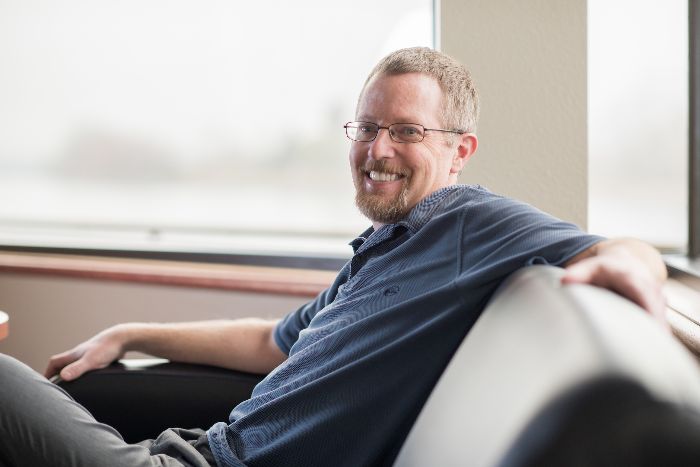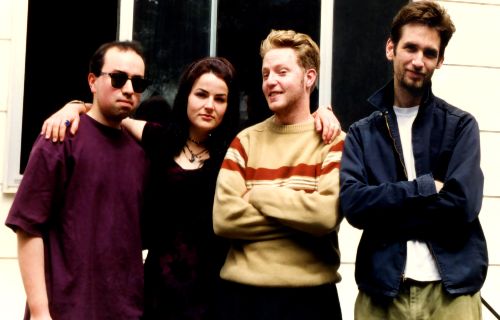Campus News
Coming full circle
Alumnus Darren Thompson, an accomplished chemist and student mentor, overcame a dark turn in his life with help from his determination, his Christian faith, and a UC Santa Cruz professor.


Content warning: This piece discusses suicide and suicidal ideation, and some people might find it disturbing. If you or someone you know is suicidal, please contact your doctor; go to your local emergency room; call the National Suicide Prevention Lifeline at 800-273-TALK (8255); or text HOME to 741741 to connect with a crisis counselor at the Crisis Text Line. The Lifeline and Text Line programs provide free, confidential support 24/7.
Darren Thompson (Crown ’95, biochemistry and molecular biology) was a gifted young chemist living and working in San Francisco when, on May 15, 1998, his life reversed course.
It was a Friday and Thompson, who suffered from depression, was overcome by feelings of hopelessness. He decided to kill himself by swallowing cyanide. He survived but the chemical left him brain-damaged, unable to walk or talk.
Today, Thompson, who earned his Ph.D. in chemistry from UC Santa Cruz, still suffers from some of the aftereffects of his suicide attempt. But thanks to his determination, his Christian faith, and a UC Santa Cruz professor, Thompson, 47, now runs his own consulting business and is mentoring budding young chemists at the University of Idaho, Coeur d’Alene.
It’s a role that brings him happiness and purpose—a life different than the one he had 23 years before.
According to Thompson, he practically grew up on the UC Santa Cruz campus. His mother was an administrative assistant for J. Herman Blake, founding provost of Oakes College, and he spent hours playing in the fields and forests of the campus with Blake’s son, Sidney.
In 1991, he came to the university as an undergrad, expecting to study physics but turned toward chemistry instead.
“I liked the reproducibility of chemistry. You could do a controlled experiment and get the same result,” said Thompson. “It doesn’t matter if it’s Santa Cruz or Barcelona, Spain, or the moon. The results should be the same.”
As a sophomore, he took a Chemistry 5 class from Distinguished Professor of Chemistry Glenn Millhauser.
“Darren was a standout student,” Millhauser said by phone from his office on the UC Santa Cruz campus. “He was super sharp, super engaged, but he always had a bit of an edge if he thought people were not keeping up intellectually.”
Thompson put it more succinctly: “Basically, I was a smart-ass.”
Still, Millhauser saw the young Thompson had “a real gift” for chemistry and invited him to work in his lab.
After Thompson graduated from UC Santa Cruz, he got a job at a commercial research lab in San Francisco. He also played guitar in a shoegazer-style band named Faded, doing gigs around the Bay Area.
On the outside, Thompson appeared confident, successful. Inside, however, he said he raged at the hopelessness of life.
Thompson said he’d watched James Bond movies where someone swallowed a cyanide pill, had a few convulsions, foamed at the mouth, and then died. Instead, he said, after he swallowed what he believed to be a lethal dose of cyanide, his head filled with excruciating pain as the chemical caused his brain to swell. He suffered for two hours before calling an ambulance. He was 24.
Thompson was put in a medically induced coma for three weeks. He lost the ability to speak and walk. A photo from the time showed his hands curled into fists, his legs thin and weak. Millhauser’s voice cracked with emotion when he recalled seeing Thompson in the hospital hooked to tubes and beeping monitors.
Five months later, Thompson was released from the hospital and returned to his mother and stepfather’s home in Santa Cruz County. He weighed 130 pounds. He needed a wheelchair to get around. His speech was slow and stunted. But his cognition was intact.
Millhauser, thinking it would be good for Thompson to be stimulated intellectually, invited his former student to attend the lab’s weekly meetings.
“It has always been the culture of my lab that anyone who is serious can be part of the team,” Millhauser explained. “We welcome them and help them develop skills so they can be successful young scientists.”
Week after week at the meeting, Thompson said nothing. Then, one day, he spoke up.
Eventually, Millhauser paired Thompson with another researcher and the pair got to work in the lab. Graduating from a wheelchair to a walker to a cane, Thompson was encouraged by Millhauser to pursue his Ph.D. In 2009, Thompson walked across a stage under his own power where Millhauser settled a doctoral stole on his shoulders.
“It was a pretty exciting day for me,” said Thompson, who also won a prestigious ARCS Foundation fellowship while at UC Santa Cruz.
One the phone, Thompson used precise, scientific terms to explain how the cyanide acted on his body. But he also was funny and self-deprecating. His slow and slightly slurred speech, he said, was like having “all the deficits of being drunk but none of the benefits.”
Thompson went on to do post-doc research at Scripps Research Institute in La Jolla, California. He has 39 published research papers to his name. But one day, he said, he went to fill up his car with gas and couldn’t remember his PIN. For a man who said he has a photographic memory, the sudden cognitive hiccup scared him. At the lab, he worked with anhydrous hydrofluoric acid, a dangerous chemical, and he worried that if his memory faltered and he did something wrong, he could accidentally release the chemical into the lab and hurt people.
He left Scripps and in 2015 he moved to his parents’ new home in Sandpoint, Idaho, where he formed his company, Peptidaho, a consulting company centered on his work with peptides.
But Thompson wanted to do more.
He approached University of Idaho, Coeur d’Alene, Director Charles Buck and Lab Coordinator John Wieser with an idea. He was given lab space and named an adjunct professor of chemistry and now volunteers in a summer program mentoring and helping a select number of students with intense research projects, passing on his love of science.
“My Christian faith helped me see that I lacked humility because, as a young person, I thought life owed me something and I was entitled to have all the stuff given to me,” he said. “But now I’ve come full circle. I think I owe this life something.”
His work with students “builds me up and gives my life purpose and meaning,” he said.
Read more about Darren Thompson.